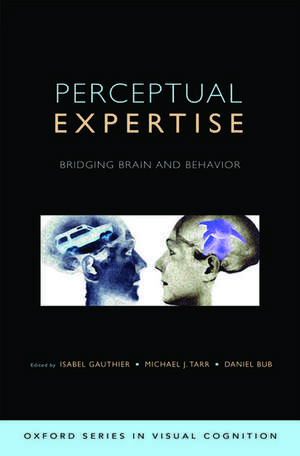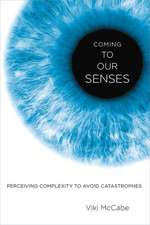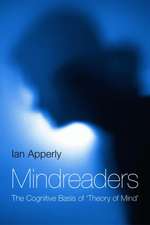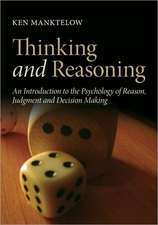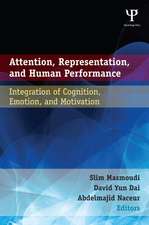Perceptual Expertise: Bridging Brain and Behavior: Advances in Visual Cognition
Autor Isabel Gauthier, Michael Tarr, Daniel Buben Limba Engleză Hardback – 4 feb 2010
Preț: 435.70 lei
Preț vechi: 836.28 lei
-48% Nou
Puncte Express: 654
Preț estimativ în valută:
83.37€ • 87.45$ • 69.41£
83.37€ • 87.45$ • 69.41£
Carte tipărită la comandă
Livrare economică 21-27 martie
Preluare comenzi: 021 569.72.76
Specificații
ISBN-13: 9780195309607
ISBN-10: 019530960X
Pagini: 416
Ilustrații: 36 halftones, 24 line illus.
Dimensiuni: 236 x 160 x 31 mm
Greutate: 0.73 kg
Editura: Oxford University Press
Colecția OUP USA
Seria Advances in Visual Cognition
Locul publicării:New York, United States
ISBN-10: 019530960X
Pagini: 416
Ilustrații: 36 halftones, 24 line illus.
Dimensiuni: 236 x 160 x 31 mm
Greutate: 0.73 kg
Editura: Oxford University Press
Colecția OUP USA
Seria Advances in Visual Cognition
Locul publicării:New York, United States
Recenzii
This volume is an excellent summary of the views expressed in independent journal articles by the Perceptual Expertise Network group. Whether one agrees with them or not, these views influenced the theory of visual perception and challenged the veracity of widely accepted brain mechanisms accounting for the human ability to easily distinguish between exemplars of visually homogeneous categories such as individual faces. It is a pleasure to read, a must for scholars interested in visual object recognition.
Why are humans so much better than machines at seeing, thinking, and acting? Because, unlike machines, we aren't hard-wired, but develop expertise over a lifetime of experience. This volume represents the current state of the art in scientific understanding of how learning hones perception and categorization. This sweeping survey provides deep insights into how perceptual expertise is acquired and lost, ranging from infant development and patient studies, to modelling and brain imaging. At the same time, it is also a refreshingly personal testimony to how scientific collaboration can advance our understanding of fascinating questions in cognitive neuroscience.
How does expertise come to be represented in the posterior part of the human brain? This beautifully crafted volume combines cognitive, patient, fMRI, ERP and developmental studies done by the world's leading researchers to summarize the state of the art on the nature and localization of expertise. It will be a major tool for researchers interested in the learning of human skills.
In true interdisciplinary fashion, this ambitious book represents the efforts of developmental and cognitive psychologists, computer scientists, neuroscientists, and neuropsychologists who have come together to unravel the secrets of how neurotypical infants, children and adults, as well as individuals with autism and prosopagnosia, learn about their visual world.
Why are humans so much better than machines at seeing, thinking, and acting? Because, unlike machines, we aren't hard-wired, but develop expertise over a lifetime of experience. This volume represents the current state of the art in scientific understanding of how learning hones perception and categorization. This sweeping survey provides deep insights into how perceptual expertise is acquired and lost, ranging from infant development and patient studies, to modelling and brain imaging. At the same time, it is also a refreshingly personal testimony to how scientific collaboration can advance our understanding of fascinating questions in cognitive neuroscience.
How does expertise come to be represented in the posterior part of the human brain? This beautifully crafted volume combines cognitive, patient, fMRI, ERP and developmental studies done by the world's leading researchers to summarize the state of the art on the nature and localization of expertise. It will be a major tool for researchers interested in the learning of human skills.
In true interdisciplinary fashion, this ambitious book represents the efforts of developmental and cognitive psychologists, computer scientists, neuroscientists, and neuropsychologists who have come together to unravel the secrets of how neurotypical infants, children and adults, as well as individuals with autism and prosopagnosia, learn about their visual world.
Notă biografică
Isabel Gauthier is from Longueuil, Québec. She received her PhD (advised by Michael Tarr) at Yale University, and is a Professor of Psychology in the department of Psychology at Vanderbilt University where she directs the Object Perception Laboratory. She directs the Perceptual Expertise Network since 2000 (now co-directed with Tom Palmeri).Michael J. Tarr hails from Pittsburgh, PA and is still a loyal Steelers fan. He received his PhD in Brain and Cognitive Sciences from MIT and was an Assistant Professor at Yale until 1995, when he moved to Brown. At Brown University he is a Professor of Cognitive and Linguistic Sciences, the Fox Professor of Ophthalmology and Visual Sciences and the Co-Director of the Brown Center for Vision Research. Daniel Bub was born in Capetown, South Africa. He obtained his Ph.D. from the University of Rochester, New York and was an Associate Professor at McGill University and a member of the Laboratoire Théophile Alajouanine at the University of Montréal
